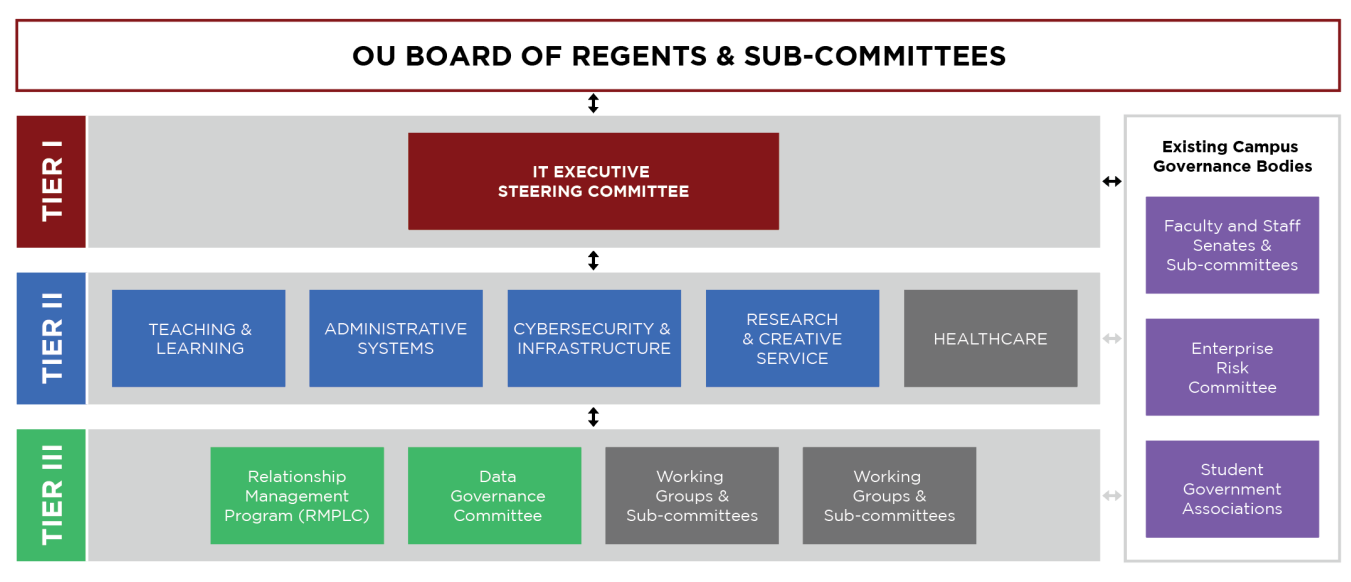IT Governance aims to align campus and mission-specific technology needs where possible, establish more effective, efficient, and transparent technology services, understand and manage University technology risk, and ensure that stakeholder groups are included in key technology decisions.
Seasonal updates or upgrades to software tend to feel like a hassle. Or getting told the software you've been used to is changing to a different, although similar, product can be outright confusing. These changes are not made at the flip of a switch. IT Governance at OU works to make sure technology decisions at OU are transparent, that they are secure from cybersecurity threats, and cost-efficient for the university.
"Basically, IT Governance is the people, process, and structures to guide decision-making. It is broad-based, transparent, and strategic." -Mark Ferguson, Director of IT Governance

The University of Oklahoma has established the three-tier, system-wide IT governance structure outlined on this page. The IT Executive Steering Committee and the Tier II Domain IT Advisory Committees include representatives from the Norman, Health Sciences Center, and Tulsa campuses.
The IT Executive Steering Committee (ITESC) oversees this framework and holds responsibility for official reporting about IT governance activities to the OU Board of Regents and its committees, as well as campus advisory bodies.
ITESC possesses the University-wide IT decision-making authority to drive mission-aligned IT investment and strategy across the Enterprise, including both central and distributed IT functions. OU IT owns the IT management function, including planning, building, running, and monitoring IT activities in alignment with the direction set by ITESC to achieve University objectives.
Tier II - Domain IT Advisory Committees are comprised of University leadership in broad domain areas (Teaching and Learning Technology, Administrative Systems, Healthcare, Cybersecurity and Infrastructure, and Research and Creative Activity). Within the context of each domain, these committees capture and communicate feedback, prioritize strategic needs, review IT services, policies, and projects to ensure they meet the needs of users, and align IT strategies with domain goals. Domain Advisory Committees establish and lead Tier III Working Groups and Task Forces to support these key functions.
These committees have a formal reporting relationship with ITESC and submit agenda items, recommendations, proposals, investments, etc. to ITESC for final review and formal voting.
Tier III User Working Groups are temporary groups or sub-committees created by ITESC or a Domain IT Advisory Committee to accomplish governance objectives. Existing governance bodies can also be appointed to work within the IT governance structure as a Tier III group for a specific purpose.
Comprised of campus users (students, faculty, and staff) and key subject matter experts, User Working Groups are guided by controls and requirements defined by the originating body. Many of these groups will dissolve once the group’s charge is complete, while others will be appointed for longer periods as necessary.
These groups will drive inclusion of OU’s complex stakeholder groups by:
Identifying new opportunities based on user needs
Collecting feedback on existing, upcoming, or potential service offerings
Conducting project or service design SME work (e.g., process analysis)
Participating in BETA opportunities, user testing, or pilot projects
Researching best practices and industry options
Informing Domain IT Advisory Committees about user impacts and needs
Existing Campus Advisory Bodies, such as the Faculty Senate, Staff Senate, Student Government Association, or the Data Governance Committee, will play a critical role within the IT governance framework through engagement with each tier of the governance framework as needed to provide stakeholder feedback, address concerns, and present topics for consideration. Where necessary, these connections will be formally documented through agenda items with the appropriate committees.